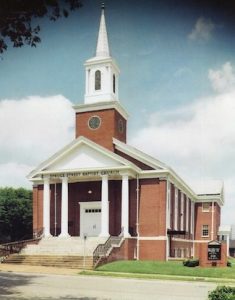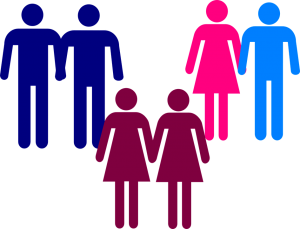In late February 2019, the General Conference of the United Methodist Church (UMC) voted, once again, to “maintain the Church’s position on homosexuality, gay clergy and gay marriage as stated in the Book of Discipline” – that is, to ban gay marriage and gay clergy. The UMC at its General Conference in April 2008 had earlier adopted language that stated, “sexual relations are affirmed only within the covenant of monogamous, heterosexual marriage,” so this recent vote reflects a long history around LGBTQ issues. The UMC Book of Discipline has held, since 1972, that “all individuals are of sacred worth but the practice of homosexuality is incompatible with Christian teaching.” Officiating at gay weddings and being a self-avowed practicing gay man or lesbian are considered serious offenses and could result in penalties, such as loss of clergy credentials. 
What effect do these decisions, over time, have on LGBTQ clergy and laypeople who consider themselves Methodists? In 2016, 111 gay UMC clergy came out publicly. In an open letter on May 8 that year, the signers proclaimed, “We are here because God has called us to serve in this denomination, and our souls are fed by the theology in which we’ve been raised.” Their Love Letter to Our Church, however, revealed the tension and hurt felt by delegates’ decisions: “[W]hile we have sought to remain faithful to our call and covenant, you have not always remained faithful to us. While you have welcomed us as pastors, youth leaders, district superintendents, bishops, professors, missionaries and other forms of religious service, you have required that we not bring our full selves to ministry, that we hide from view our sexual orientations and gender identities.”
The letter further drew on sobering statistics to remind readers of some of the tragic results of exclusion:
“These [LGBTQI young people in hostile UMC churches] are more at risk for suicide than their peers, in part, because of the condemnation they hear from the pulpits and pews of their churches. We come out to remind them that God’s love for them is immeasurable, and offers them a love that will never let them go, even when it feels like the church is willing to let them go.”
 The Episcopal Church in the US has also struggled with the issue of homosexuality, as have many other denominations. The ECUSA, however, has gone in the other direction. After many years of discussion and debate, the 2018 General Convention of the Episcopal Church passed a resolution that “expanded the right for gay couples to marry in all dioceses even where local bishops theologically object to same-sex marriage.” This was the culmination of other actions:
The Episcopal Church in the US has also struggled with the issue of homosexuality, as have many other denominations. The ECUSA, however, has gone in the other direction. After many years of discussion and debate, the 2018 General Convention of the Episcopal Church passed a resolution that “expanded the right for gay couples to marry in all dioceses even where local bishops theologically object to same-sex marriage.” This was the culmination of other actions:
“In 2003, the first openly gay bishop was consecrated [the Right Reverend Gene Robinson in New Hampshire]; in 2009, General Convention resolved that God’s call is open to all; in 2012, a provisional rite of blessing for same-gender relationships was authorized, and discrimination against transgender persons in the ordination process was officially prohibited; and in 2015, the canons of the church were changed to make the rite of marriage available to all people, regardless of gender.” Currently there is one openly lesbian bishop serving in the Church – the Right Reverend Mary Glasspool, Assistant Bishop in the Episcopal Diocese of New York – and an openly gay, married man, the Rev. Thomas Brown, has just been elected Bishop of Maine. (Full disclosure: Thomas was a former rector of mine.)
Episcopalians too felt hurt and rejected by our Church in the decades and centuries before these progressive decisions were made. Members of any denomination know well the struggle to decide whether to stick it out when they do not feel welcomed or leave and try to find a more compatible church home. The decision is highly personal and can change over time.
If there are Methodists out there who might feel that it’s now time to find a new church home, the Episcopal Church might be an option. There are a number of features that would be familiar to you:
- The church year is the same, with the same liturgical seasons, such as Advent, Lent, Easter, etc.
- Many of the hymns and hymn tunes will be very familiar to you.

- Both denominations use the Revised Common Lectionary, which means that Methodists and Episcopalians are generally hearing many of the same scripture readings every Sunday.
- The colors of the vestments and altar cloths, based upon season and other criteria, are similar between the denominations. That is, when one walks into an Episcopal church, the ministers will be dressed similarly to what Methodist clergy wear and how the altar appears. (One major difference is that bishops in the Episcopal Church wear specific vestments different from priests, while Methodist bishops do not wear special vestments.)
- Women have been ordained ministers in the Methodist movement from its very beginnings, and it was in its General Conference in 1956 that the UMC granted women full clergy rights.
 (The Episcopal Church has only ordained women since 1974, with the so-called Philadelphia Eleven.)
(The Episcopal Church has only ordained women since 1974, with the so-called Philadelphia Eleven.) - Both Methodists and Episcopalians recognize the Sacraments of Baptism and Holy Communion (the Lord’s Supper, Eucharist). Sacraments are defined as “outward and visible signs of inward and spiritual grace.” (Book of Common Prayer, page 857) The Episcopal Church has five additional Sacraments – Confirmation, Ordination, Holy Matrimony, Reconciliation of a Penitent, and Unction (Anointing of the Sick or Dying) (BCP, pp. 860-861).
- While Confirmation (usually of young adults) is not a Sacrament per se for Methodists, it is still an important rite for them.
None of this is to put down the UMC wholesale. Methodism has served millions of people well over the centuries, and obviously it continues to serve many today. (On a personal note, my great-grandmother was a lifelong Methodist and beloved organist in a Methodist church in Massachusetts for most of her life.) This is also not an attempt to whitewash the Episcopal Church – we have certainly had many blemishes of our own.
This is merely an invitation to those who may be looking for an alternative at this time in their lives. A Methodist visitor to an Episcopal church will most likely recognize many features and practices with which they are familiar and with which they will feel at home. If you are an LGBTQ Methodist, especially, feeling the push to explore other church organizations, there may be an Episcopal parish near you that would meet most if not all of your needs. In June, you might be able to identify one that specifically welcomes you by noticing the colorful pride flag in or outside the building!
